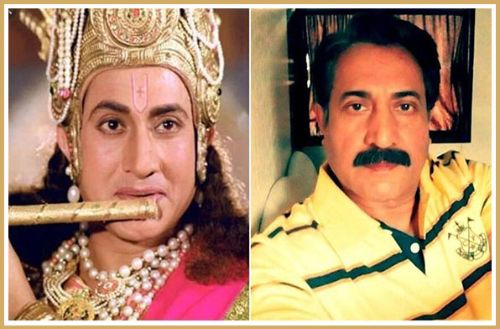Sarvadaman Banerjee

Subscribe to read full article
This section is for paid subscribers only. Our subscription is only $37/- for one full year.
You get unlimited access to all paid section and features on the website with this subscription.
Not ready for a full subscription?
You can access this article for $2 , and have it saved to your account for one year.
- Born: 14 March 1965 (Magarwara, Unnao, Uttar Pradesh)
- Primary Cinema: Bengali
- Spouse: Alankrita Banerjee
- Children: Aalika
Film and television actor Sarvadaman Banerjee is known for his works in various language cinemas including Hindi, Bengali and Telugu. He has mostly been part of historical and mythological films and shows. While he won attention essaying the title roles in Adi Shankaracharya (1983), which won the National Film Award for Best Feature Film, and Vivekananda (1998) respectively, in the 1986 film Sirivennela, he played a blind flautist. Other films he has to his credit include M S Dhoni: The Untold Story (2016), Shri Datta Darshanam (1985), and Godfather (2022). His popularity further grew after he starred in Ramanand Sagar's mythological television series Shri Krishna (1993).
He was born Sarvadaman Banerjee into a Bengali family on 14 March 1965, in Magarwara, Unnao, Uttar Pradesh. Schooled at St. Aloysius School, Kanpur, he went on to graduate from the Pune Film Institute.
It was with the biopic Adi Shankaracharya (1983) that he first made waves. Directed by G V Iyer, it was the first Indian film to be made in Sanskrit. The film follows the life and times of Sankara - the founder of the non-duality (Advaita) school of Indian philosophy. He played the title role of the 8th-century Hindu philosopher, Adi Shankaracharya, who consolidated the doctrine of Advaita Vedanta in Hindu philosophy. The film is a key example of experimental filmmaking in the Kannada film industry. At the 31st National Film Awards, it won four awards, including best film, best screenplay, best cinematography and best audiography.
Two years later, he essayed the title role of Sridatta in Shri Datta Darshanam (1985), which narrated the tale of Lord Dattatreya and how he has benefited various disciples including Vishnudatta, Kartaveeryarjuna and Indra. Directed by Kamalakara Kameshwara Rao, the film’s cast also included Ramana Murthi and J V Jyotirmayi.
The K Vishwanath Telugu directorial Sirivennela (1986) saw him star alongside Suhasini, Moon Moon Sen and Meena. The film won five Nandi awards, and was also screened at the Asia Pacific Film Festival, the International Film Festival of India, the Moscow Film Festival and the AISFM Film Festival. Shot in Jaipur and Kerala, the film included Pandit Hariprasad Chaurasia's flute rendering and a cameo of drummer Sivamani. He played Hari Prasad, a blind flautist who lives along with his younger sister in a village near Jaipur, which is also a tourist attraction. Though he lacks knowledge of classical music, he plays the flute beautifully and makes a living by playing it to tourists. One day, a guide Jyothirmai (Moon Moon Sen) comes there along with a bunch of tourists and listens to his flute. She understands his talent and helps him understand nature and to become a famous flautist. Years pass and Hari Prasad becomes Pandit Hari Prasad. Unknown to her, Hari Prasad admires her greatly and dedicates all his albums to her. Meanwhile, a mute painter Subhashini (Suhasini) who meets him in his village, also takes a liking to him. Subhashini expresses her emotions through her paintings and gradually her brother understands her feelings regarding Hari Prasad. He approaches Hari Prasad's uncle with a marriage proposal. However, at the same time, Hari Prasad reveals his admiration for Jyothirmai. This shocks Jyothirmai as she previously worked as an escort to rich tourists. She tries to hint to Hari Prasad about her not-so-decent past, and eventually also tells him that she is already engaged to a doctor. Hari Prasad takes this news well as he always wanted Jyothirmai to be happy, and helps arrange her wedding. However, on the wedding day, Jyothirmai commits suicide and requests in her last note that her eyes should be donated to Hari Prasad. She also requests that her funeral procession should appear like a marriage procession and that her death should be hidden from Hari Prasad. The film ends with Hari Prasad and Subhashini mourning silently in the graveyard.
He played the role of Bhaskar in Swayam Krushi (1987), a K Viswanath directorial about a cobbler who believes in hard work and righteousness. Starring Chiranjeevi, Vijayshanti, and Sumalatha, the premise of the film was about respecting the importance of manual labour.
In 1998, he essayed the title role in Vivekananda, a biopic based on the life of Bengali Hindu monk Narendra Nath Datta also known as Vivekananda, from his birth (1863) to his return to India from the west (1887). Directed by G V Iyer, it is a spiritual take on Vivekananda’s life, focussing on his internal struggles and questions about the meaning and truth of life.
His fame further grew with popular devotional TV serials, namely Ramanand Sagar’s Shri Krishna (1993 – 1997) and Om Namah Shivay (1997 – 1999). The former told the story of Lord Krishna’s coming. When evil takes over the world, Lord Vishnu incarnates into the world as Shri Krishna for the protection of the righteous and the destruction of the wicked. Banerjee played the deity over 221 episodes, in a cast that also included Sandeep Mohan, and Mahendra Ghule. He essayed Rajkumar Vrishdwaj in Om Namah Shivay, the Hindu devotional saga of Lord Shiva.
According to reports, after moving away from television, Banerjee started his dream project – a meditation centre called the Light House in Rishikesh, Uttarakhand. Here, he, along with his wife Alankrita, teaches yoga and meditation.
References
https://www.facebook.com/TimelessIndianMelodies/photos/a.596656383701291/3452832678083633/?type=3
https://www.imdb.com/name/nm0051850/bio?ref_=nm_ov_bio_sm
https://timesofindia.indiatimes.com/tv/news/hindi/Krishna-Know-the-real-avatars-of-Lord-Krishnas-of-TV/photostory/40326961.cms?picid=40327543
https://starsunfolded.com/sarvadaman-d-banerjee/
Image courtesy:
https://www.google.com/search?q=sarvadaman+banerjee+in+ms+dhoni&rlz=1C1CHZL_enIN877IN877&source=lnms&tbm=isch&sa=X&ved=2ahUKEwiY29DJpbD8AhXgtmMGHQSPCwQQ_AUoAXoECAEQAw&biw=1048&bih=1030&dpr=0.9#imgrc=2h3PDnsOB0JoXM







.jpg)



